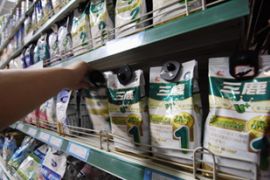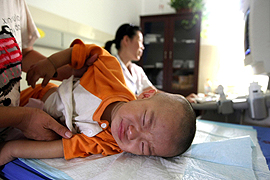China milk scandal fallout builds
New Zealand owners of dairy at centre of scandal “appalled” at delays in action.

Melamine, which is normally used in the manufacture of plastics, has a high nitrogen content that can fool quality tests for protein content in milk.
“Appalling” allegations
It is thought to have been added to watered-down milk at some point in the supply chain to mask the effects of dilution.
|
Dairy crisis timeline |
|
According to CCTV, Sanlu first learned on June 1 that its milk had been tainted with melamine. Five babies were hospitalised, suffering from kidney stones But it was not until August 2 that Sanlu began to do anything to prevent the sale of the milk, notifying the local government in Shijiazhuang that its milk was tainted. On August 6 Sanlu pulled the milk from its distributors, but did not announce a public recall. Finally, on September 11, Sanlu publicly recalled 700 tonnes of its baby formula, while the government vowed serious punishment for those involved. |
If consumed by humans it can cause kidney stones and other potentially fatal complications, especially in small children.
On Wednesday Andrew Ferrier, Fonterra’s chief executive, told an annual results meeting in Wellington that he did not believe Sanlu, the Chinese dairy company at the heart of the scandal, would recover from the damage.
He said that Sanlu, which is 43 per cent owned by Fonterra, had been taken over by the Chinese government which had since shut down its operations.
Fonterra, which trades dairy products in 140 countries around the world, planned to introduce “comprehensive testing for every conceivable poison” in all milk it purchases, Ferrier said.
Ferrier said he was “appalled” if Chinese media allegations prove true that Sanlu had received complaints about its infant formula as early as December last year, but did not alert Chinese authorities until the beginning of August.
He declined to speculate on suggestions that the scandal may have been covered up because first reports of the contamination coincided with the start of the Beijing Olympic games.
Fonterra says it first alerted authorities in the Chinese province of Hebei, home to Sanlu’s headquarters, but were told the problem was being dealt with.
“Deeply saddened”
But Al Jazeera’s Laura Kyle, reporting from Beijing, says questions are being asked why Fonterra did not raise the issue with the top levels of the Chinese government until more than a month later.
 |
| Some 54,000 babies have been sickened as a result of tainted milk [AFP] |
Ferrier said that Fonterra pushed for an immediate public recall of Sanlu infant formula from that time, but a recall was only ordered on September 9 after the New Zealand government alerted central government authorities in Beijing.
“We pushed as hard as we could in the system,” Ferrier told reporters in Wellington.
“We are deeply, deeply saddened that this could happen and apologise to all the Chinese families affected.”
His remarks echoed a statement from Henry van der Heyden, Fonterra’s chairman, who said the revelations over Sanlu’s apparent inaction over the crisis were “deeply concerning” and referred to the contamination as a “criminal event”.
“That Fonterra was not informed earlier is frankly appalling,” he said.
Tesco withdrawal
Tesco, the British supermarket chain, said on Wednesday that it had withdrawn a brand of Chinese sweets as a result of concerns over the contamination.
The company said it had no evidence that the White Rabbit sweets were tainted, but that they had been taken off shelves on Tuesday as a precautionary measure.
The sweets are sold in a small number of British stores as part of the supermarket’s ethnic range.
Tesco has also withdrawn the product from its stores in China and Malaysia, the only two other countries where Tesco sells the sweets.
At least 12 countries, including Indonesia and Colombia, have banned Chinese dairy products amid fears that many Chinese milk products could have been tainted by melamine.
Worries that compromised ingredients may have contaminated other foods like yogurts, cookies and candies have led several more countries to step up testing of Chinese imports.
The European Union has urged customs authorities to intensify checks on imports of “composite products” such as bread or chocolate, to ensure they contain no traces of contaminated milk.